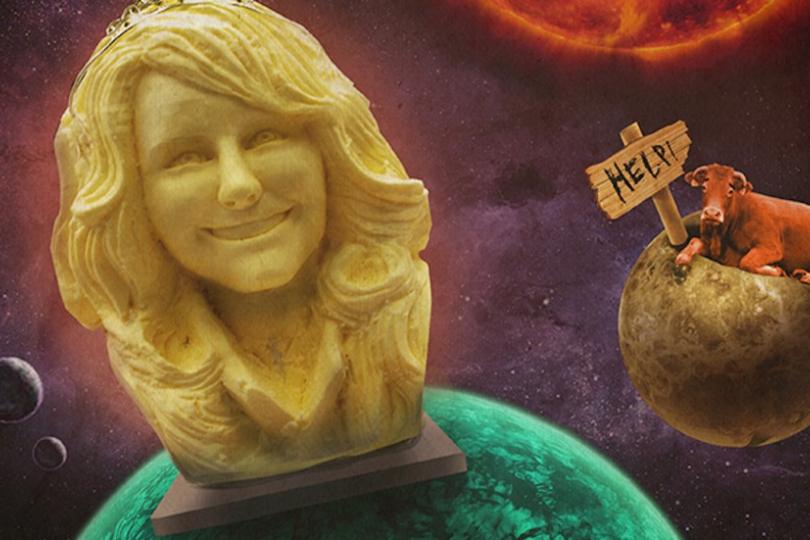Day 5 -- Fringe Recap

Space is the Place
One of the underrated aspects of the Fringe Festival is that it’s one of the few times of the year when genre theater gets a turn in the spotlight. While there are certainly outlets for horror, sci-fi and fantasy productions throughout the season - the Twin Cities Horror Festival being maybe the most visible example - something about Fringe seems to grant theatergoers permission to indulge their nerdier sides. Maybe it’s because the festival attracts audiences who don’t generally turn out for traditional theater, or perhaps something about the shorter format and smaller scale is conducive to genre exercises. Whatever the reason, Fringe is just about the only place where you could hope to see four theater productions about outer-space travel back-to-back on a Monday evening. So that’s just what I did.
Possibility
Despite its title, Sunday Night Fold’s To the Moon is only tangentially a sci-fi piece. It’s somewhere in between a fantasy, a fable, and a fairy tale, yet it also feels grounded and believable in a way few Fringe shows can claim. A childless couple is visited by a mysterious boy with a cryptic message telling them to go to the moon and complete their family, so they set off on a reluctant quest that takes them through all manner of strange and bittersweet adventures. Their long walk to the moon is abetted by an omniscient narrator who may or may not be part of her own narrative.
Tyler Mills’s script is filled with whimsy and weirdness, but also a melancholy that leavens every interaction with an ineffable sadness. (There were definitely a few audible sniffles reverberating in the Illusion by show’s end.) That isn’t to say To the Moon is a downer. On the contrary, it’s a dreamy, very funny fantasy quest in the vein of L. Frank Baum’s Oz books. The writing is buoyant and enigmatic, Derek Trost’s multi-instrumental musical accompaniment is evocative without being obtrusive, and the acting is on-point, particularly Tyler Michaels pulling off multiple roles (the program credits him as “Everyone Else”) with various levels of manic aplomb. This is outer space as endless possibility, an unknowable world where the things that vex us on Earth might just start to make sense.
Anarchy
In its first moments, Little Lifeboats’ Confessions of a Butter Princess, or Why the Cow Jumped Over the Moon seems as though it’s heading in a recognizable direction, with the titular cow relating the sad story of how she wound up stranded in space after over-jumping her target. Twisted takes on nursery rhymes are nothing especially new in the Fringe-verse, so it’s refreshing that Abby Swafford’s script quickly pushes things in more surprising directions. Seems the cow has been stranded on an icy dwarf planet along with an exiled Minnesota Dairy Queen and her court of conniving princesses, all of whom are locked in an endless struggle for control of the sacred churn that provides them with their all-important butter.
If that plot description didn’t make a lot of sense to you, don’t worry. Sense isn’t something Confessions of a Butter Princess particularly aims for. This is outer space as anarchy, a bizarre realm where terrestrial rules don’t apply. Lactose intolerance is less forgivable than murder, offhand comments cue up ‘90s pop hits from beyond the stars, and a flamboyant, sexually ambiguous cow (Hector Edwardo Chavarria in a rather delightful performance) can become the most important person in the universe. Director Chris Garza makes fine use of the Theatre in the Round, keeping the action rolling in a steady whirlwind of ungainly movements. As with most wacky comedies, the laugh lines are hit-or-miss, and the relentless loopiness of the proceedings sometimes gets wearying or just plain confusing, but it’s shot through with an amiable insanity that makes it hard to dislike.
(One peculiar side note: Both To the Moon and Confessions involve the availability of space butter as a recurring plot point. I defy you to show me anywhere outside of the Fringe where you’re gonna see that.)
Familiarity
The Star Wars parody is, at this point, practically a genre unto itself. It’s hard to think of an angle that hasn’t been done a dozen times over, and for me it’s even harder to get excited about seeing any of those angles taken again. Musical parodies in particular are nothing new - heck, I can still recite half the lyrics from Mad Magazine’s show-tunified Star Wars spoof from 1978 - but that doesn’t mean they can’t still draw a crowd.
I was somewhat heartened to see the ticket line for A Funny Thing Happened on the Way to the Death Star snaking down the block in front of the Rarig. A nearly sold-out house suggested that the show might offer something more than the expected pop culture name-checks, Jar-Jar disses and Ewok puns. Sadly, that’s exactly what I got. An early Airplane! allusion makes it clear that Go for Broke Productions is aiming for nothing more than old-school Zucker-Abrams-Zucker zaniness and referential gags galore. A little of that kind of thing goes a long way for me. I was fully prepared to spend the next hour rolling my eyes.
I did do plenty of cringing over the course of Death Star, but I can’t deny I laughed a fair bit too. As a Star Wars fan since childhood, I’m not above chuckling at a well-timed Admiral Ackbar gag. Still, the overall experience was almost as dispiriting as anticipated. There’s clearly an audience for this show and Go for Broke obviously knows that audience and how to give it exactly what it wants. This is outer space as familiar territory, a production that takes for granted that its viewers know every inch of its galaxy far, far away as intimately as its performers do. You could take that concept down some intriguing alleys, but Death Star isn’t interested in exploring them, because it doesn’t have to be. You’ll never go broke making easy Star Wars musical parodies, as Mad Magazine learned. And The Simpsons. And Robot Chicken. And Family Guy. And Weird Al Yankovic. And… eh, you get the picture.
Escape
Thursday Night’s Everybody Wants You to Live might have been Monday night’s most traditional sci-fi offering. Granted, a play about four first-time astronauts sorting out their various sexualities, philosophies and childhood traumas while flying to Mars as part of an ambitious new reality show sounds pretty modern, but at its core Kip Dooley and Alex Burchfield’s story bears a resemblance to any number of early Cold War movies that dug for the humanity underneath the brave new high-tech world. As the mission wears on, of course, the crew begins to open up about their reasons for joining. Turns out people with happy home lives don’t tend to ditch their planet for a potentially one-way trip to Mars.
This is outer space as escape, a clean slate where the mistakes and regrets of Earth are so far removed from your physical consciousness that it’s easy to convince yourself that your mental and emotional departments will follow suit. It’s a keen concept, but unfortunately, Everybody Wants You to Live couldn’t quite grab me. It has a lot going for it conceptually, with a number of standout scenes and a startlingly strong performance by Ilana Kapra as the bubbly but haunted youngest member of the crew. Still, with four equally important main characters and at least eight fairly vital tertiary players who pop up in flashbacks and cutaways, there just isn’t room for anyone’s story to fully develop over the course of an hour-long play. Much like its subject matter, it’s an admirable, lofty mission held back by terrestrial limitations.
Space is the Place
On the surface, space travel wouldn’t seem to be the most obvious topic to receive multiple treatments at the Fringe. With very little room for the elaborate sets and futuristic effects that most laypeople associate (however incorrectly) with the genre, you could easily see it as a self-defeating subject for a small production. But that’s part of the beauty of theater, and of the Fringe Festival in particular. Given the built-in obstructions of low budgets, small stages and brief running times, some artists will always take up the challenge of building as expansive a world as possible. The options are as endless as the expanse of space. The joy is in watching which corners the creators choose to explore.




